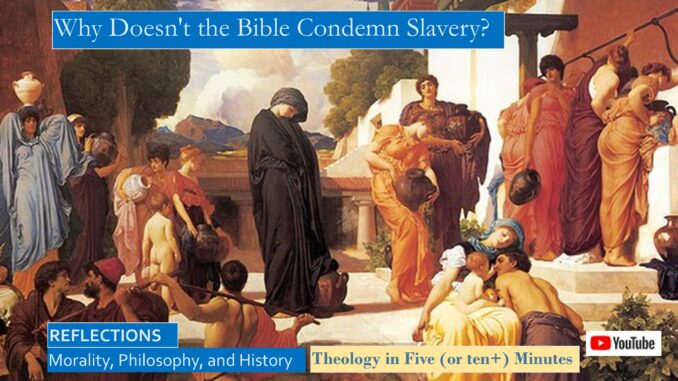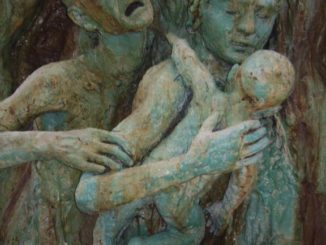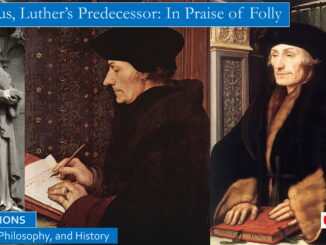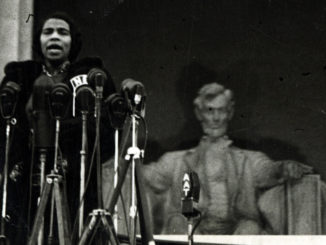
Why doesn’t the Bible condemn slavery?
Great Britain abolished the slave trade in 1807, and slavery itself in 1833, the United States abolished chattel slavery after the Civil War when the thirteenth amendment was ratified in 1865, so many modern skeptics ask, Why doesn’t the Bible condemn slavery?
Second Founding: The Reconstruction Amendments to the Constitution
https://youtu.be/UciDV5laOLg
And the YouTube video for, Why doesn’t the Bible condemn slavery? https://youtu.be/Tz8EVYLuYoc
One simplistic answer is that slavery existed for thousands and perhaps tens of thousands of years, and society has only abolished chattel slavery over the past two hundred years, and the Bible was written not hundreds of years ago, but thousands of years ago.
To answer the question, you must first answer this question, Who were slaves?
Are slaves defined only as people who can be bought and sold, like talking livestock?
Are the servants and handmaidens in the Old Testament stories of the Patriarchs, including Abraham, Jacob, Joseph and others, considered slaves? In the ancient world, many of these servants really had limited job mobility, and the distinction between slave and servant is not that well-defined.
What about medieval serfs and Spartan helots, who were bound to farm the land on which were born, and serve the owner of that land, and were not permitted to move, should they be considered as slaves? What about sharecroppers after the Civil War, should they be considered as slaves? These laborers, who often did not have enough to eat, and lived a miserable life, but they clearly could not be bought and sold like livestock.
What about modern minimum wage workers who do not earn a living wage? Should they be considered slaves?
When we reflected on the role slaves played in the ancient world, we learned that slaves were so numerous that they were the employees of the ancient world, one major difference is they could not choose their masters, and they could not escape a cruel master.
Slaves in the Ancient World, Were Slaves the Employees of the Ancient World?
https://youtu.be/O67cmVRvBtA
We made a slide on the various types of slaves. The least worse type of slave to be was a household slave, or a slave that worked on small farms alongside their master. They were often treated better than most slaves. This category would also include the medieval serfs, and perhaps the sharecropper farmer after the Civil War.
Household slaves were often considered part of the family, this was true in ancient Greece, and it was true among the servants of the patriarchs of the Old Testament. Sometimes the handmaidens intermarried into the family, if necessary, to continue the bloodline, Abraham’s wife Sarah, whose handmaiden Hagar gave birth to Ishmael, and Jacob’s wives Rachel and Leah, who offered their handmaidens to their husband Jacob. Often this was done to guarantee there would be children to continue the household.
There was a dark side for many female household slaves, servants, and indeed for all poor and working-class women in both ancient and modern times, and that dark side is the problem of sexual exploitation of young women. This was all too common in the ancient world; the plot of the Iliad of Homer revolves around men fighting over concubines captured during raids during the Trojan War. The capturing of concubines was common for most ancient armies, the Torah has laws requiring Jewish soldiers to treat captured concubines with the same respect as Jewish wives. And our modern MeToo movement encourages men to treat women with respect.
Concubines in the Iliad, Old Testament and Christian Tradition
https://youtu.be/bGHHD7XTvr0
These laws in the Torah sought to improve the lives of these concubines captured in war, and over the centuries, both Judaism and Christianity sought to improve the treatment of both slaves and the poor, particularly poor women.
Teachings about Slavery in the Bible and by the Early Church Fathers
https://youtu.be/poyvJajCXnE
The Old Testament recognizes how slavery can kill the spirit and soul of the slave. The implication is clear, just as slavery harmed the Israelites enslaved in Egypt, so it harms those enslaved by the Israelites. Yahweh in Leviticus exhorts,
“I am the Lord your God who brought you out of the land of Egypt, to be their slaves no more; I have broken the bars of your yoke and made you walk erect.”[1]
Throughout the Old Testament, Yahweh constantly reminds his people Israel, “The alien who resides with you shall be to you as the citizen among you; you shall love the alien as yourself, for you were aliens in the land of Egypt: I am the Lord your God.”[2]
When Christianity was a new religion, consisting of a tiny minority, they had no power to improve the legal status of slaves.
How did Judaism and Christianity seek to improve the lot of slaves over the centuries?
- The Jewish Torah has many laws on freeing slaves, forbidding masters to murder or abuse their slaves.
- The early apostles and the Stoic Philosophers sought to treat slaves with dignity, as equals, as people who should be treated with respect, not as people who can be abused.
- For example, St Paul and Seneca urged us to treat slaves as equals, deserving of respect.
- The early Church Fathers sought to further improve the treatment of slaves.
Although the New Testament does not explicitly condemn slavery, St Paul does exhort us in Galatians to treat slaves as one in Christ: “There is no longer Jew or Greek, there is no longer slave or free, there is no longer male and female; for all of you are one in Christ Jesus.”[3]
There is another remarkable book in the Bible, that is also one of the shortest, where St Paul sends a runaway slave Onesimus back to his master, Philemon. St Paul first praises Philemon for the love he has shown Paul: “When I remember you in my prayers, I always thank my God because I hear of your love for all the saints and your faith toward the Lord Jesus. I pray that the sharing of your faith may become effective when you perceive all the good that we may do for Christ. I have indeed received much joy and encouragement from your love, because the hearts of the saints have been refreshed through you, my brother.”[4]
But we must presume that Philemon was not showing Christian love towards his slave, Onesimus, and indeed must have been abusing his loyal slave, for his slave risks his life to travel a great distance to visit with Paul in prison, and we read between the lines that Paul likely allowed him to stay for several months to recover physically and spiritually from his mistreatment before he sends him back. St Paul gives Onesimus this letter to give to his master Philemon: “I am appealing to you for my child, Onesimus, whose father I have become during my imprisonment. Formerly he was useless to you, but now he is indeed useful both to you and to me. I am sending him, that is, my own heart, back to you.”[5]
Why did St Paul delay in instructing our beloved slave to return to his master? Perhaps partially because it took time to prod Onesimus to do what he dreaded, return to his master. St Paul exhorts Philemon, “Perhaps this is the reason he was separated from you for a while, so that you might have him back forever, no longer as a slave but more than a slave, a beloved brother—especially to me but how much more to you, both in the flesh and in the Lord.”[6]
St Paul also made a copy of this letter so he could circulate this epistle, and ultimately to Christians two millennia later, as an instruction for all Christians on how we should treat each other, and how we should treat the poor among us. In his closing St Paul strongly asserts that not only must slaves obey, masters, like Philemon, must also obey, they must treat slaves as their brothers in Christ: “If you consider me your partner, welcome Onesimus as you would welcome me. If he has wronged you in any way, or owes you anything, charge that to my account. I, Paul, am writing this with my own hand: I will repay it. I say nothing about your owing me even your own self. Yes, brother, let me have this benefit from you in the Lord! Refresh my heart in Christ. Confident of your obedience, I am writing to you, knowing that you will do even more than I say.”[7]
We reviewed the slave autobiography of the spellbinding abolitionist orator and best-selling author Frederick Douglass, who escaped slavery in the decades preceding the Civil War, and he has much to say of the hypocrisy of those slaveholders who were supposedly good Christians but who cruelly whipped and abused their slaves, and in my sister blog I quote from an actual story of a supposed Christian whose slave was lame from his mistreatment, and how he turned out this slave to starve because she was no longer productive.
Frederick Douglass Tells Us About His Life as a Slave in his Autobiography
https://youtu.be/7VkzhyNnuQk
In modern times, both the Catholic and Protestant Churches have sought to improve the condition of the low-income worker through the Social Justice movement, which seeks to show greater compassion to the poor, and guaranteeing the low-income worker a living wage. Pope Leo XIII issued the decree, Rerum Novarum, in 1891, that expressed the Catholic doctrine of the “preferential option for the poor,” seeking that all laborers can earn a living wage so they can live their lives with dignity and respect. [8]
Scholars suggest that Rerum Novarum may have inspired the policies of the New Deal, which sought to ensure that every laborer who worked forty hours a week would be entitled to a living wage, where he could feed, cloth, and house his family in dignity. During World War II this was summarized in the principles of the Four Freedoms, where in addition to guaranteeing citizens freedom of speech and freedom of worship, they should also be guaranteed freedom from want and freedom from fear. Hard working workers, who work full-time, who are unable to provide for their family, are never truly free, they are really wage slaves.[9]
The Bible does not condemn chattel slavery, or the institution of slavery, because, as Jesus exhorts, the poor will always be with us, there will always be wage slaves, because the rich will always take advantage of poor, seeking to pay them starvation wages.
The Bible exhorts us, instead, to love our neighbor as we love ourselves. Those who pay slave wages to their laborers do not love their workers, they do not love their neighbors, and we as Christians need to vote for politicians who champion a minimum wage that is a living wage with adequate health care and housing, anything less is WAGE SLAVERY. Simply put, you can attend church every night of the week, make a show of being such a good Christian, but if you don’t show kindness and love to your neighbor, all your spiritual efforts are in vain; if you don’t love your neighbor, then you don’t Love God, which others have put simply and elegantly.
https://www.youtube.com/watch?v=epArSqlMQ-E
[1] https://www.biblegateway.com/passage/?search=Leviticus+26%3A13&version=NRSVCE
[2] https://www.biblegateway.com/passage/?search=Leviticus+19%3A34&version=NRSVCE
[3] https://www.biblegateway.com/passage/?search=Galatians+3%3A28&version=NRSVCE
[4] https://www.biblegateway.com/passage/?search=Philemon+1%3A4-7&version=NRSVCE
[5] https://www.biblegateway.com/passage/?search=Philemon+1%3A10-12&version=NRSVCE
[6] https://www.biblegateway.com/passage/?search=Philemon+1%3A15-16&version=NRSVCE
[7] https://www.biblegateway.com/passage/?search=Philemon+1%3A17-21&version=NRSVCE




Be the first to comment